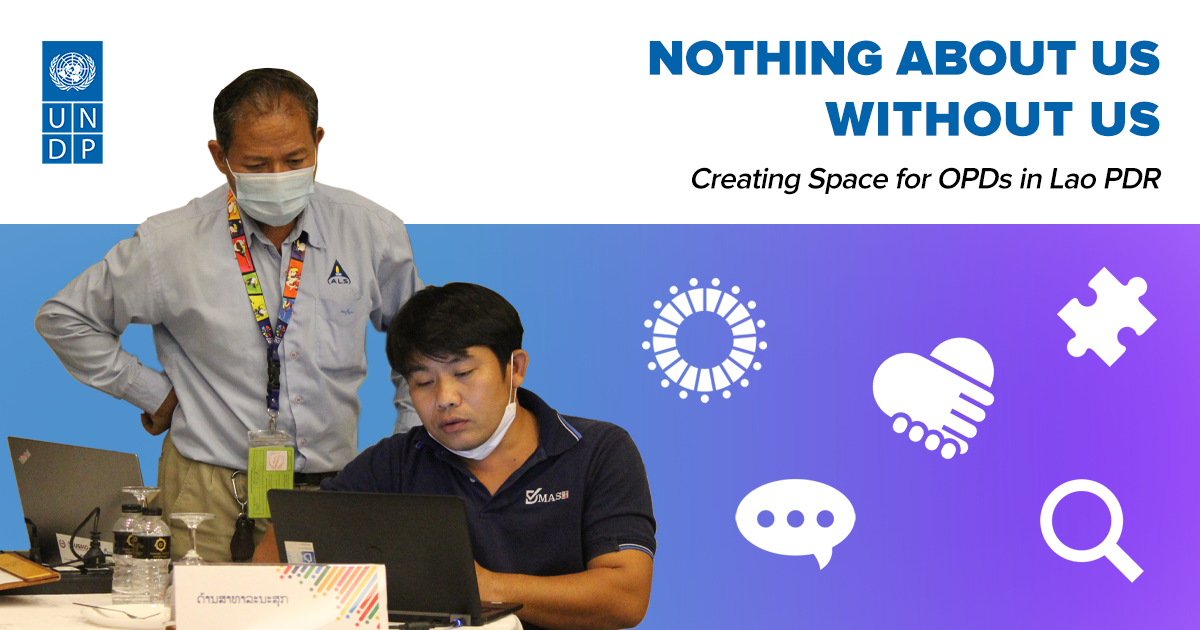International Day of Persons with Disabilities is celebrated on 3 December each year and aims to promote the rights and wellbeing of persons with disabilities in all aspects of society and development, and to increase awareness of the situation of persons with disabilities in political, social, economic and cultural life.
Nothing About Us Without Us: Creating Space for Persons with Disabilities in Lao PDR
December 3, 2021
For the Lao version ສຳລັບບົດຄວາມພາສາລາວ: Download
Image: UNDP Lao PDR
Since International Day of Persons with Disabilities was first celebrated in 1992, there has been a seismic shift in the role played by persons with disabilities in society, as they now look to take the lead in shaping a more disability-inclusive world. This movement is best seen through the creation of the United Nations Convention on the Rights of Persons with Disabilities, or CRPD, which was driven by persons with disabilities, with a clear message: Nothing about us without us.
And this message is no different in Lao PDR.
Organizations of Persons with Disabilities, or OPDs, represent many diverse groups among the estimated one million persons with disabilities in the country and help give a voice to those who otherwise may never be heard.
The OPDs in Lao PDR play a crucial role in collecting data, monitoring the situation of persons with disabilities on the ground, advocating for greater inclusion in society, and even stepping in to deliver essential services, such as healthcare and education. This creates a virtuous loop whereby OPDs capture the real lived experiences of persons with disabilities, then advocate for changes in law and policy, and finally monitor these changes to see if they make a real difference in the lives of persons with disabilities.
Crucial for this loop to work is ensuring that OPDs have the space to fulfill their role at each important step. In practice, this means helping OPDs develop their capacity, creating more awareness for their work, and, most importantly, making sure they fully participate in decisions that affect persons with disabilities.
In 2021, UNDP focused on growing this space for OPDs in Lao PDR.
UNDP, in collaboration with OHCRH, UNFPA, World Education and Humanity and Inclusion, delivered training for OPDs on disability data collection so that we could better understand the barriers faced by persons with disabilities across the country. Throughout the year, UNDP has provided technical support to 11 OPDs operating in 10 Provinces for their contribution report to the CRPD Committee ahead of Lao PDR’s review under the Convention in 2022. Their report aims to reflect the lived experiences of persons with different disabilities across the sectors and provides an invaluable opportunity for OPDs to make recommendations directly to the Government.
Providing the space for OPDs to raise awareness of the challenges faced by persons with disabilities is crucial, and so UNDP partnered with OPDs to host a national radio programme to hear directly from persons with disabilities on their hopes and challenges, including representatives from the deaf, blind and autistic communities. In December, UNDP will partner with OPDs to host a national briefing for key stakeholders, including the Government, Embassies and international organizations, to share the key recommendations from their contribution report to the CRPD review in 2022.
What we have learned is that no one knows better what persons with disabilities need more than persons with disabilities themselves. With the right support, OPDs can play their role in capturing the real lived experiences of persons with disabilities. But this is not enough. We must ensure that space is made at the table for OPDs, including at the very highest levels. To do this, we must move past simply consulting them. We must embrace the full participation of OPDs at every stage in decision-making. We must create the space for them to develop their organizations, to work closely together across organizations, and the space to advocate for the changes they need. It is only by ensuring this can we achieve the ambitions of Lao PDR under the United Nations Sustainable Development Goals by 2030, in leaving no one behind, and honouring the commitment made to persons with disabilities under the CRPD: Nothing about us without us.
Written by:
Ms. Ricarda Rieger, UNDP Lao PDR Resident Representative
The views expressed in this article are those of the authors alone and not the United Nations Development Programme.

 Locations
Locations




